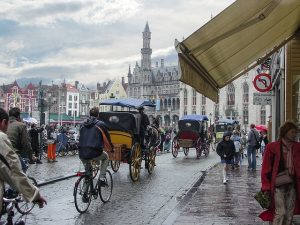How to do Business in Belgium

How to do business in Europe I
June 19, 2017
Protectionism by the Trump Administration
June 26, 2017Why Belgium? The obvious answer would be because it is my home country, country where I grew up and started my first professional business steps.
Nevertheless, it is not because it is my own country that it will be the easiest country to define. Indeed, as most of you will probably know, Belgium has several specific particularities that made it sometimes a tough country to deal with.
The first one… Belgians tent to think of themselves as Europeans first, Walloons or Flemings second, and Belgians third.
Belgium is a relatively small country and people generally make their cultural choices from within their own community, therefore it’s difficult to give a generalised over view of local culture in Belgium.
Flemish (much like Dutch), French and German are the three official languages in Belgium. Around 60% of the population has Flemish as its mother tongue, while close to 40% has French as mother tongue. Less than a percent of the population speaks German as their main language. Each community is traditionally from specific geographic regions. They usually coexist through much of the country, especially in Brussels. But it is very important not to assume that the cultures of these different regions are interchangeable, as Belgian businesspeople will take offence to that, mainly between Dutch speakers and French speakers.
Therefore, many foreigners find themselves having to become familiar with not just one, but multiple business cultures in Belgium. There are big contrasts between its two predominant communities – the Walloons and the Flemings. With a quarter of the population being foreign, Belgium’s business culture is further diversified.
It is very common for Belgians to be multilingual, but it is generally recommended to find out previously which language the interlocutors are most comfortable speaking as some Belgians might be offended if they are spoken to in the wrong language. In case of doubt, English is usually a well-accepted neutral option.
Although deeply traditional in many ways, the Belgians are flexible and have international perspectives. Belgium can be small and difficult, but it is a country fully open for business.
Business structure
Flemish business culture tends to follow a model like German and Dutch, as a hard-worker style and businesses tend to be organised horizontally, while Belgian-French business culture is like in France, where businesses are structured according to strict hierarchy. A trait shared by all business cultures in Belgium is an insistence on compromise. We could say that Flemings can be a little bit more focussed over the tasks they must do than the Walloons; the Walloon will usually matter over unformal matters before getting into the business.
Meetings
A typical business day in Belgium usually starts at 8:30 am and ends around 17:30, even though sometimes it can be extended a bit, but for a Belgian it is very important to equilibrate their professional life with their personal life.
Belgian meetings are very professional, to the point and solution-driven and there are conducted formally. Participants are expected to arrive punctually as if you are late it will cause an unreliable impression, and the meeting should be structured and efficient.
In Belgium, the usual is to organise a meeting a few days before the desired date; once the date and time have been agreed, it is no longer necessary to check or confirm it. If later conflicts of priorities change happen, it will be worth explaining the situation to the Belgian partner, which will certainly understand and will proceed to an organisation alternative.
Meetings will usually be set at mid-morning or mid-afternoon. Belgians like to meet the people with whom they do business, and part of the first meetings are often devoted to personal issues rather than only professionals. This does not mean, however, that establish a personal relationship is a prerequisite for a trade negotiation.

Bruges ©Pixabay
Business relations
The Belgians behave in a friendly manner and are usually direct, honest and frank. They give much less importance to the formalities than the French.
After the pertinent presentations, Belgians tend to get straight down to the business, but they can surprise you other times starting the meeting with informal conversations before getting to the heart of the matter.
Mutual trust is very much appreciated by the Belgian businessmen, and a small initial chat allows to create a more relaxed atmosphere. A recommendation; if you are the one who will hold the meeting, start speaking in an informal tone and let the Belgian interlocutor starting the business conversation.
Given their long experience in international business, Belgians are skilful and understanding negotiators. They have a flexible approach to make transactions that would be mutually beneficial for both parts.
Their approach is generally more explanatory, focused on the relations and flexibility. Belgians always listen to their interlocutor but this does not automatically mean that they agree with you, they are receptive to your ideas, as long as they have sense. The Belgians will search agreements in an intelligent manner to eliminate any possible problem or misunderstanding.
Indeed, the desire to reach an agreement satisfying merely both parts stimulates the Belgians to come with non-conventional creative ideas, but always looking towards their goal. Make sure to dedicate the necessary time for this! A common mistake that some people usually do is to begin the session with words such as: “We need to resolve this up to five hours, because I have to take my plane …”.
The styles of the negotiations do not differ much between the various communities. The Flemings are a little more direct and incisive that the Walloons, which are likely to be more focused on the relations. Men and women are treated as equal, as well as the representatives of the ethnic minorities.
It would be logical to send one of your executive directors to negotiations, although Belgium is rapidly changing the culture to the one based on the achievements.
Greetings
In general, you must use the standard of courtesy title followed by the last name of the person (Dutch forms to address are: Meneer & Mevrouw [Mr.] & [Ms.] and French forms are Monsieur & Madame [Mr.] & [Ms.]).
The standard greeting among people is a brief handshake. When the relationship is more friendly gesture may be replaced by three kisses on the cheeks. Men are never given kisses, always greet each other shaking hands.
How to introduce oneself
When meeting someone, a greeting with a handshake and the formula “Aangenaam” in Flemish and “Enchanté” in French.
The Belgians don’t tend to give too much importance to the university degrees and/or professional. However, as said earlier, they appreciate the detail to speak their language, French or Dutch.
Dressing codes
- The men usually dress in dark colours, sober costumes with white shirt and silk tie.
- The women wear costumes made of jacket and skirt or classic dresses.
- Men should wear shoes with laces, because the moccasins and shoes without laces is too informal.
Last but not least…
- Public confrontation is frowned upon and compromise for the greater good is highly valued. It is an important quintessentially Belgian value.
- Don’t be late. Punctuality is important, and lateness is frowned upon.
- Do dress well. Belgian businesspeople tend to be stylish.
- Don’t discuss personal matters or the cultural divisions in Belgium. Belgium’s politics is very complex and can lead to discomfort with some people. It is also highly recommended not to compare a Belgian with its neighbours (French and Dutch) nor to confuse their three cultural groups and their languages.
- Try to respect the “personal area” of the Belgians when greeting (around 50 cm). Maintain the visual contact during the meeting, but avoid it to be too intense, in order not to seem too invasive. In general, Belgians never discuss personal subjects except with close friends. Because of their private nature, Belgians don’t usually discuss money matters outside of business.
- A business card translated on the one side to French and in Dutch on the other side is a sign of respect and consideration toward the host partner, but in English it is perfectly fine as well.
- Humour, if used at all in business, would tend to be included at the beginning or end of a meeting rather than during any of the substantive issues.
- Talking too much about your education, professional experience, business success, and related achievements may be considered a boosting.
- When preparing the trip to Belgium (and all subsequent meetings), keep in mind that Belgians usually take big part of their holidays in July or August.
Régis Glaude, Strategic International Consultant at How2Go Spain

